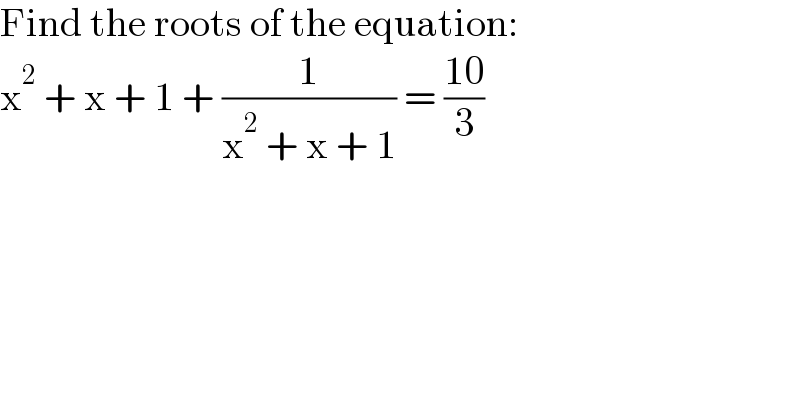
Question Number 149766 by mathdanisur last updated on 07/Aug/21

$$\mathrm{Find}\:\mathrm{the}\:\mathrm{roots}\:\mathrm{of}\:\mathrm{the}\:\mathrm{equation}: \\ $$$$\mathrm{x}^{\mathrm{2}} \:+\:\mathrm{x}\:+\:\mathrm{1}\:+\:\frac{\mathrm{1}}{\mathrm{x}^{\mathrm{2}} \:+\:\mathrm{x}\:+\:\mathrm{1}}\:=\:\frac{\mathrm{10}}{\mathrm{3}} \\ $$
Commented by amin96 last updated on 07/Aug/21

$${x}^{\mathrm{2}} +\mathrm{x}+\mathrm{1}=\mathrm{y}\:\:\:\:\Rightarrow\:\:{y}+\frac{\mathrm{1}}{{y}}=\frac{\mathrm{10}}{\mathrm{3}} \\ $$$${y}^{\mathrm{2}} +\mathrm{1}=\frac{\mathrm{10}{y}}{\mathrm{3}}\:\:\Rightarrow\:\:\mathrm{3}{y}^{\mathrm{2}} −\mathrm{10}{y}+\mathrm{3}=\mathrm{0} \\ $$$$\Delta=\mathrm{100}−\mathrm{36}=\mathrm{64}\:\:\:\:{y}=\frac{\mathrm{10}+\mathrm{8}}{\mathrm{6}}=\mathrm{3} \\ $$$${x}^{\mathrm{2}} +{x}+\mathrm{1}=\mathrm{3}\:\:\Rightarrow\:\:{x}^{\mathrm{2}} +{x}−\mathrm{2}=\mathrm{0}\:\:\:\Delta=\mathrm{9} \\ $$$$\begin{cases}{{x}_{\mathrm{1}} =\frac{−\mathrm{1}+\mathrm{3}}{\mathrm{2}}=\mathrm{1}}\\{{x}_{\mathrm{2}} =\frac{−\mathrm{1}−\mathrm{3}}{\mathrm{2}}=−\mathrm{2}}\end{cases}\:\: \\ $$
Commented by mathdanisur last updated on 07/Aug/21

$$\mathrm{Thankyou}\:\mathrm{Ser} \\ $$
Answered by Canebulok last updated on 07/Aug/21

$$\: \\ $$$$\boldsymbol{{Solution}}: \\ $$$${let}: \\ $$$$\Rightarrow\:{x}^{\mathrm{2}} +{x}+\mathrm{1}\:=\:{k} \\ $$$$\because \\ $$$$\Rightarrow\:{k}+\frac{\mathrm{1}}{{k}}\:=\:\frac{\mathrm{10}}{\mathrm{3}} \\ $$$$\Rightarrow\:{k}^{\mathrm{2}} +\mathrm{1}\:=\:\frac{\mathrm{10}}{\mathrm{3}}\centerdot{k} \\ $$$$\Rightarrow\:{k}^{\mathrm{2}} −\frac{\mathrm{10}}{\mathrm{3}}\centerdot{k}+\mathrm{1}\:=\:\mathrm{0} \\ $$$${By}\:{using}\:{quadratic}\:{formula}: \\ $$$$\Rightarrow\:{k}\:=\:\frac{\left(\frac{\mathrm{10}}{\mathrm{3}}\right)\pm\sqrt{\left(−\frac{\mathrm{10}}{\mathrm{3}}\right)^{\mathrm{2}} −\mathrm{4}}}{\mathrm{2}} \\ $$$$\: \\ $$$$\:\:\:\:\:\:\:\:\:\:=\:\frac{\left(\frac{\mathrm{10}}{\mathrm{3}}\right)\pm\sqrt{\frac{\mathrm{64}}{\mathrm{9}}}}{\mathrm{2}} \\ $$$$\because \\ $$$$\Rightarrow\:{k}\:=\:\mathrm{3}\:\:\:;\:\:\:{k}\:=\:\frac{\mathrm{1}}{\mathrm{3}} \\ $$$${By}\:{substituting}\:{back}: \\ $$$$\left(\mathrm{1}{st}\:{solutions}\right) \\ $$$$\Rightarrow\:{x}^{\mathrm{2}} +{x}+\mathrm{1}\:=\:\mathrm{3} \\ $$$$\Rightarrow\:{x}^{\mathrm{2}} +{x}−\mathrm{2}\:=\:\mathrm{0} \\ $$$$\Rightarrow\:\left({x}+\mathrm{2}\right)\left({x}−\mathrm{1}\right)\:=\:\mathrm{0} \\ $$$$\Rightarrow\:{x}_{\mathrm{1}} \:=\:−\mathrm{2}\:\:\:;\:\:{x}_{\mathrm{2}} \:=\:\mathrm{1} \\ $$$$\: \\ $$$$\left(\mathrm{2}{nd}\:{solutions}\right) \\ $$$$\Rightarrow\:{x}^{\mathrm{2}} +{x}+\mathrm{1}\:=\:\frac{\mathrm{1}}{\mathrm{3}} \\ $$$$\Rightarrow\:{x}^{\mathrm{2}} +{x}+\frac{\mathrm{2}}{\mathrm{3}}\:=\:\mathrm{0} \\ $$$${By}\:{quadratic}\:{formula}: \\ $$$$\Rightarrow\:{x}\:=\:\frac{−\mathrm{1}\pm\sqrt{\mathrm{1}^{\mathrm{2}} −\mathrm{4}\left(\frac{\mathrm{2}}{\mathrm{3}}\right)}}{\mathrm{2}} \\ $$$$\: \\ $$$$\:\:\:\:\:\:{x}_{\mathrm{3},\mathrm{4}} \:\:=\:\frac{−\mathrm{1}\pm{i}\sqrt{\frac{\mathrm{5}}{\mathrm{3}}}}{\mathrm{2}} \\ $$$$\: \\ $$$$\boldsymbol{{Solution}}\:\boldsymbol{{by}}:\:{Kevin} \\ $$
Commented by mathdanisur last updated on 07/Aug/21

$$\mathrm{Thankyou}\:\boldsymbol{\mathrm{S}}\mathrm{er} \\ $$
